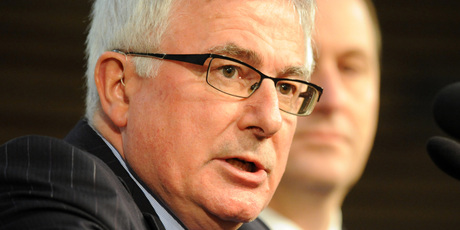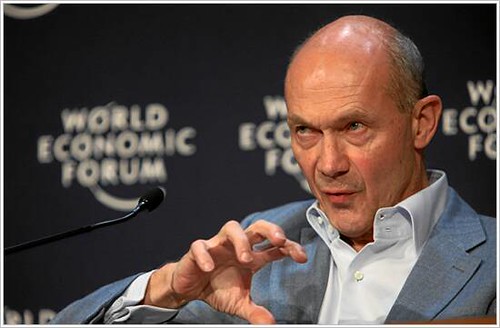 (Tim Groser, Minister of Trade, New Zealand)
(Tim Groser, Minister of Trade, New Zealand)
(Pascal Lamy, DG, WTO)
News of Tim Groser being in the race for the next WTO DG after Pascal Lamy (his second four year term ends in September 2013) is trickling in. The NZherald news confirmed this. Tim Groser has served New Zealand in a number of capacities including being New Zealand's chief negotiator in the Uruguay Round of trade talks. He is presently Minister of Trade of New Zealand. The IELP blog carried a speech of his recently highlighting his views on international law and the loss of sovereignty.
Tim Groser speaking at the 8th Ministerial Conference at Doha recently had opined about the way forward in the Doha round and how to get over the impasse:
"While we strengthen the existing system, deal with the 20th Century problems that lie at the heart of the Doha Development Agenda, we also need to look forward to emerging issues. The WTO is the place countries deal with the whole gamut of trade issues. The Doha mandate covers a subset of those issues. We need to accelerate our understanding of these emerging issues. This will be politically possible only if it is done explicitly on the basis that we are not trying to redefine the mandate. The developing countries would reject such an approach out of hand. But we need to start understanding emerging issues like the implications of the global supply chain for WTO Rules. Similarly, there is a whole set of issues in the trade and environment space that are going to demand attention, not simply the issue of environmental goods and services and the agreement we need on fishery subsidies that must be part of any Doha outcome. If we can develop a sense amongst negotiators that there are some solutions out there, this will exert positive gravitational pull on the Doha mandated issues and deal in part with the legitimate concern that we need to keep our system up to date.
Our thinking is based on a frank admission that the path forward is by definition unclear. Therefore a more subtle, less prescriptive approach aimed at three levels - strengthening the existing defences against protectionism, finding ways forward on the 20th Century agenda defined by the Doha Mandate with development at the centre of that mandate, and starting to point the way forward on 21st Century issues - is the way forward."
His speech recently too highlighted the Doha impasse, the way forward and the need to recognize the multipolarity of today's global governance, especially in international trade:
"We are moving towards a multi-hegemonic system of power but the global governance system that would match that is remarkably immature My central view is that it is not a fundamentally different system that needs to be designed, but rather the informal modus operandi of the system needs to change to reflect the shift in relative power.
The issue here is about leadership: no system of global governance can work without it. When China joined the WTO I heard some deeply experienced people speculate on how the WTO would work with the ‘800 pound gorilla’ in the ring. The concern is entirely the wrong way round. The greater danger is the opposite – these great emerging economies may not use their huge weight and influence to provide leadership but behave too passively.
There can be no definitive conclusion to this. I think we are in a process of transition and the trick here will be to ensure that something gets done on both trade and climate change during that transition."
The race for the next WTO DG might have just begun. Some have argued that the next head must be from a developing economy to reflect changed dynamics and realities of world trade. Whoever the next chief is, the task would be an arduous one - to get Doha back on track and ensure multilateralism prevails in the context of increasing trends of protectionism.
No comments:
Post a Comment